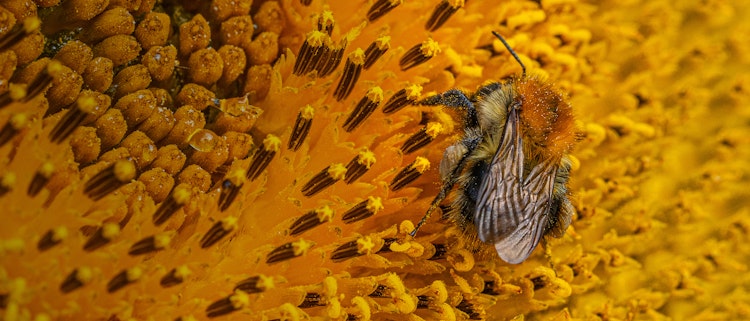Winter Beavers at Downicary – When Wetlands Begin to Work
Explore winter rewilding at Downicary as Ecotalk tracks beavers, wetlands and wildlife, revealing how water, trees and patience are transforming the land.

Although Ecotalk has rebranded, and we’ve set ourselves a new mission to bring back Britain’s lost rainforests, we haven’t forgotten the humble bee – which has been one of our emblems since our mobile service started in 2018.
Bees will always be important to us no matter what type of rewilding project we’re embarking on. Bees, along with hundreds of other types of insects, are pollinators and our natural ecosystem depends on them. They are a bellwether species – when there are fewer bees, we know that nature is suffering. And, on the flipside, when nature suffers bees disappear. It’s catch-22.
When Labour won the election, we were pleased that the new government promised to ban a neonicotinoid pesticide, which is so toxic that one teaspoon of it will kill 1.25 billion bees. Why it was ever allowed in the first place is baffles us. The agricultural industry relies on natural pollinators for crops from apples to broccoli to raspberries and tomatoes, but with bees in decline farmers are spending billions on artificial pollination.
To preserve nature in Britain, and for a healthy agricultural sector, bees need our protection. There are 270 bee species in the UK but, according to Friends of the Earth, 13 have been lost since 1900 and another 35 are under threat of extinction. Even among the strongest of Britain’s bee species, numbers are in decline with struggling populations more vulnerable to disease. The story is even worse for moths and butterflies.
Pesticides, intensive farming, extreme weather due to climate change, loss of flowery habitats, non-native invasive plants and animals – all these factors are making life very difficult for pollinators in Britain. For these creatures, it’s as though a desert is spreading with food, water and shelter increasingly scarce.
Bees are so important because they are at the fulcrum of the entire ecosystem. Every spring and summer they pollinate the following year’s generation of wild trees, shrubs and flowers. If those plants don’t come through, life is harder for other insects, as well as birds, mammals and even fish higher up the food chain. The same goes in agriculture, but it’s we who will suffer as crops fail.
This is why, throughout Ecotalk’s history, we’ve put an emphasis on bees. Initially, at Lynch Knoll in Gloucestershire, we gave 40 acres back to nature – at first letting it run wild and then planting 20,000 trees to replace the ancient woodland that had previously been felled there. It gave bees, birds and other wildlife a new haven amongst the local farms, towns and villages.
At Bowyers Wood in East Sussex, areas of open land and scrub are rewilding on the edges of the woodland space, full of plant species that attract pollinators such as bees and butterflies. Similarly, at Cym Uchaf in Gwynedd, we are planting a mix of native tree species on a former sheep farm and bees will play a vital role helping the accompanying vegetation develop, replacing open fields with woodland.
Bees will be just as important as we protect and expand areas of ancient rainforest as part of our current mission.
To keep up to date, sign up for our monthly newsletter, The Buzz, below. Another tip of the hat to the humble bee.